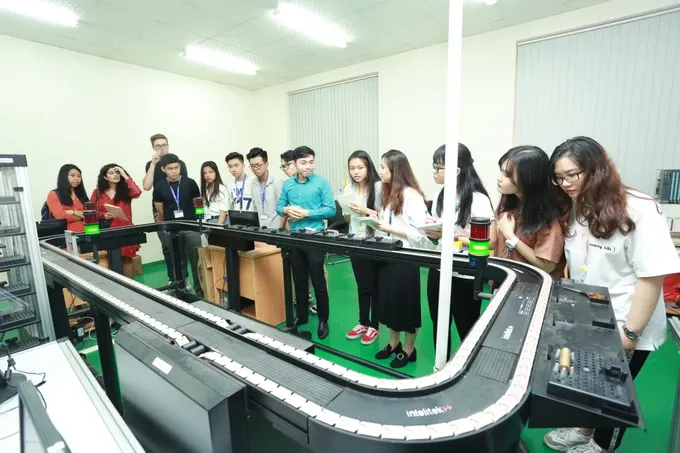
Vice Chairwoman of the National Assembly’s Culture and Education Committee Dr. Nguyen Thi Mai Hoa stated that university autonomy is a breakthrough policy to help comprehensively transform higher education in Vietnam in compliance with Resolution 29. This has so far created positive impacts on the whole tertiary education system on the way to train high-quality human resources for the country.
The awareness about this matter has increased, and there is a consensus in the whole political system, leading to major improvements in administration and management tasks.
Deputy Director Nguyen Anh Dung of the Higher Education Department (under the Ministry of Education and Training) shared that legal documents like Resolution 29 (with its 7 innovative perspectives and 9 solutions to achieve the 7 targets in tertiary education), Resolution 77/NQ-CP in 2014 to allow 23 universities to pilot autonomy, and the amended Education Law, and Decree 99/ND-CP in 2019 have all give way for breakthroughs in this educational level.
The number of lecturers holding a doctorate degree rose from under 15 percent in 2013 to more than 30 percent in 2022, with the figure for autonomous universities being 50 percent. The quantity of higher educational institutes obtaining quality accreditation for their training curricula and training sites also grew to 1,000 and 200 respectively. Many universities have formed their council. Several enter the lists of global top universities.
President Ngo Thi Phuong Lan of the University of Social Sciences and Humanities (Vietnam National University-HCM) commented that after 10 years implementing Resolution 29, a lot of universities have gradually become more autonomous in their organizational structure, human resources, finance, and professional activities, along with their accountability to stakeholders and the close monitoring of the society.
Positive as it seems, the adoption of Resolution 29 still witnesses various challenges.
Former Deputy Minister of Education and Training Bui Van Ga voiced that a university council is formed in accordance with the law, yet its power and effectiveness are rather limited. For instance, in Da Nang City, a manager in the municipal Department of Education and Training joins several university councils, and hence is not able to fulfill his multiple duties successfully.
To increase the autonomy among universities and reach the set targets by Resolution 29, it is advisable to change power approaches of a university council in that the governing body authorizes the power to the corresponding university council and gradually reduces the former’s role in correlation with the growth of the latter, which operates independently like the model of newly formed universities in Vietnam.
Vice Chairman of the Vietnam Universities and Colleges Association Prof. Dr. Trinh Quang Phu agreed that Resolution 29 on comprehensive and fundamental renovation in education – training in Vietnam plays a decisive role in human resources training. During this renovation, university autonomy is inevitable.
However, the applicable laws and mechanisms cannot keep up with this renovation, hence the pilot of autonomy among certain universities. Thanks to this, the Government can then evaluate the right and wrong in this process for precise adjustments of related legal documents and mechanisms to better suit the reality.
According to Chairman of the above association Dr. Vu Ngoc Hoang, university autonomy should strictly obey existing laws. Yet as these laws are inconsistent and even contradictory to some extent, it is confusing for the implementers. He suggested that the Education Law and the Higher Education Law, after careful adjustments, must become the basic reference to amend other related laws.
Vice President of Nong Lam University – HCMC Dr. Tran Dinh Ly said that the trend of establishing schools under a university is unavoidable and will positively influence the operation as there is more decentralization and authority delivery.
Universities will become more active and comprehensively autonomous to improve their own training quality, research activities, and human resources development. Nevertheless, the success of this autonomy process depends on the extent of decentralization, especially in financial matters. Also, the units receiving new authority should meet the requirements for a stable and sustainable development; otherwise, this autonomy implementation is merely and trendy act without any meaningful results.
Expert on educational economy Tran Anh Nguyet from the World Bank in Vietnam voiced that the financial autonomy policy must correspond with a reduction in financial aid from the national budget and an increase in cost sharing.
It is necessary to avoid shifting this financial burden to students and their families when public investments for tertiary education are still low and many universities have to depend on school fee for their operation.
This means Vietnam should amend necessary legal documents relevant to financial autonomy and accountability, increase the national budget allocation to higher education from the current proportion of 0.23 percent to 0,8-1 percent of the GDP by 2030. This extra money will directly support both educational institutes and students (via scholarships, school fee reduction or exemption policies, student loans).
In addition, investments from the national budget should be more into research and university development (from 18 percent to 30 percent) in accordance with their potential and human resources proportion. More finance can be mobilized from society via the public-private partnership models and revenue diversification.
























